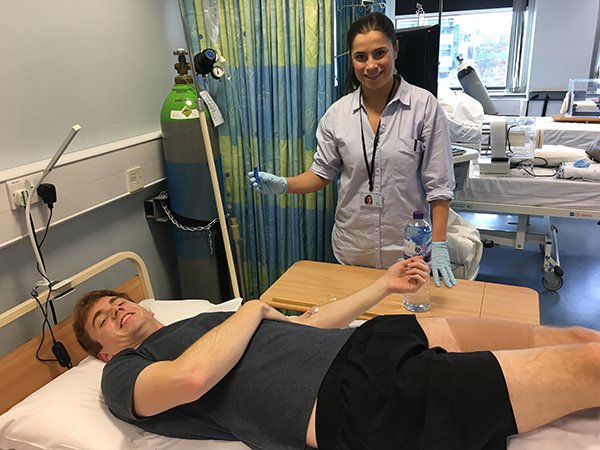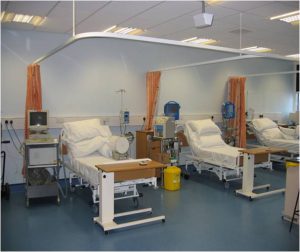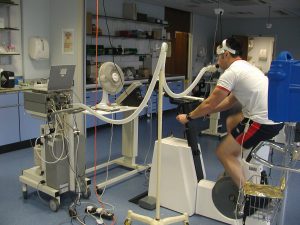
October 2, 2019, by bmillar
How lying in bed will help future manned missions to Mars
Scientists at the University of Nottingham are helping to push back the boundaries of space travel in a new study to examine a potentially serious adverse effect of weightlessness on the human body.
The 3-day bed rest study is being carried out in Nottingham in parallel to a 60-day bed rest study currently being run by the European Space Agency at the MEDES facility in Toulouse, France. Bed rest is a tried and tested way to measure the effects of weightlessness on the human body which include bone and muscle mass loss, cardiovascular decline and impaired carbohydrate metabolism which could be a risk for type 2 diabetes.

Many astronauts come back to Earth from space showing signs of pre-diabetes as weightlessness can lead to insulin resistance whereby the muscles and liver can’t absorb glucose to help regulate blood sugar levels. The Nottingham study is specifically aiming to find out how quickly we develop insulin resistance from prolonged bed rest, and what are the mechanisms driving this harmful effect.
Ten healthy male volunteers have been recruited to take part in the study in the Medical School at the Queen’s Medical Centre in Nottingham from October 2017. After baseline tests for body composition, and muscle mass including MRI scans and muscle biopsies, the participants will spend three days lying flat in bed in a slight head-down incline to mimic weightlessness in zero-gravity.

Professor of Metabolic Physiology, Ian Macdonald, said: “There is a big push at the moment for a manned mission to Mars – a journey that would take as long as 9 months with huge implications for the fitness of the astronauts. Multiple scientific groups across NASA, the UK Space Agency and ESA, are working on many aspects of this physical deterioration in zero gravity and we hope our contribution to this will be significant and possibly lead to further studies about insulin resistance over a longer time period.”
Co-leading the study, Professor of Muscle Metabolism, Paul Greenhaff, said: “Non-weight-bearing in astronauts has a big impact on the body. We have seen them come back to Earth with reduced muscle mass, bone density and even swollen heads through changes in fluid distribution in the body. Pre-diabetes is also a side effect and it is this aspect that we want to investigate as part of the wider ESA studies.
“Over the period of bed rest, we will use the gold standard method to measure insulin resistance in our ten participants. This is called an ‘insulin clamp’ and it shows us exactly how much glucose is being taken up by the muscles. We also use stable isotope tracers, administered orally to show how glucose uptake by muscles changes over time as the bed rest progresses. We expect to find an accelerated onset of insulin resistance in the first 3 days of bed rest and we hope to answer significant questions about the rate and magnitude of that resistance and associated muscle wasting.”
The current space exercise protocol dictates that to prevent gross muscle atrophy, astronauts have to do around 2 hours of intense physical exercise a day in space and take on a set number of calories to give them the best chance of maintaining physical fitness. The Nottingham research team aims to work out when the most detrimental changes take place, possibly in the first week in space, then they may be able to offset these changes by a programme of early rehabilitation exercises.

Dr Hannah Crossland, Research Associate, said: “My primary role in this project is to analyse the muscle biopsies taken from these participants for various enzymes and proteins important in carbohydrate metabolism, in order to try and understand the underlying mechanisms within the muscle that may be driving the harmful effects of bed rest. In my current work I am also using stable isotope tracer and mass spectrometry techniques to measure some of the changes that occur to muscle mass and breakdown within this period, as well as how the rehabilitation exercises may offset these changes following the bed rest.”
At MEDES in France, the participants in the longer bed rest study are also having an antioxidant cocktail versus placebo to see if this can prevent insulin resistance and some of the detrimental changes. This could mean that astronauts end up having an antioxidant supplement in their diet to mitigate some of these detrimental effects. Importantly, this research has implications not only for astronauts, but for the general population who may spend periods of time in bed secondary to illness or injury. This research will give us insight into the rate of changes that these detrimental processes occur to the musculoskeletal system and pave the way for further studies looking at interventions to prevent this.
No comments yet, fill out a comment to be the first

Leave a Reply